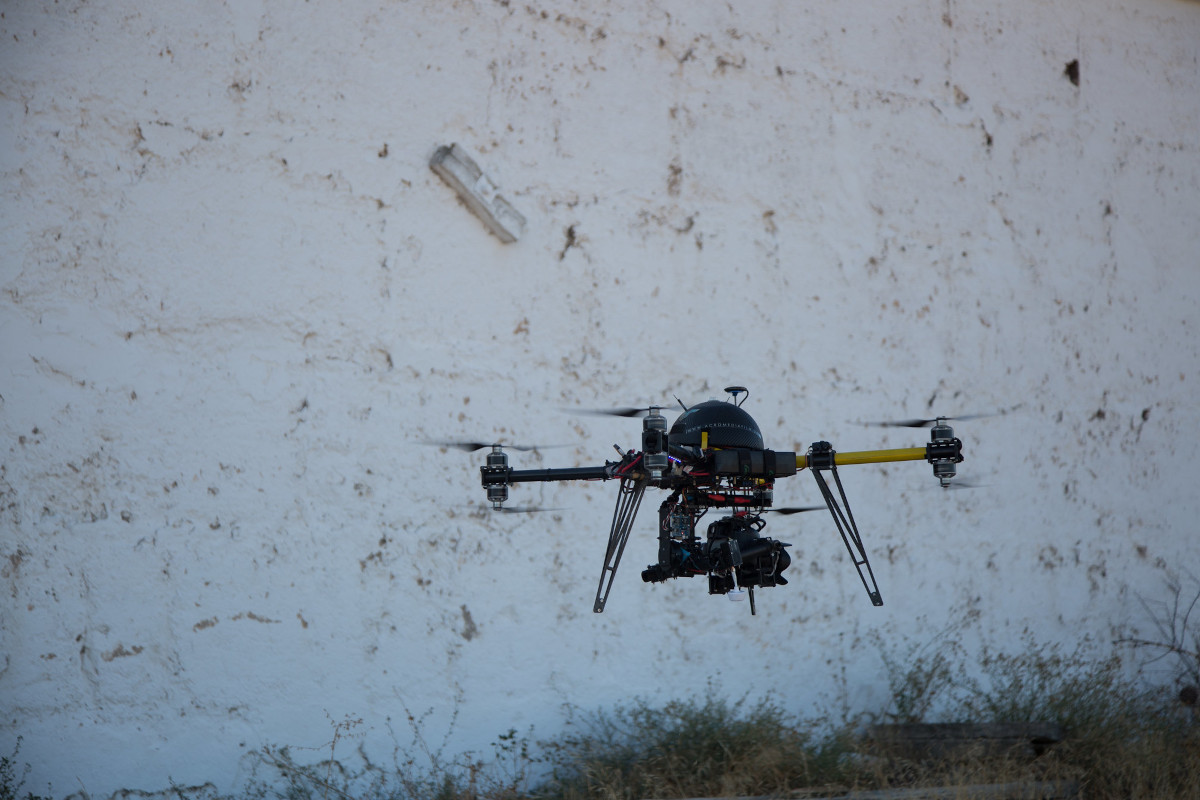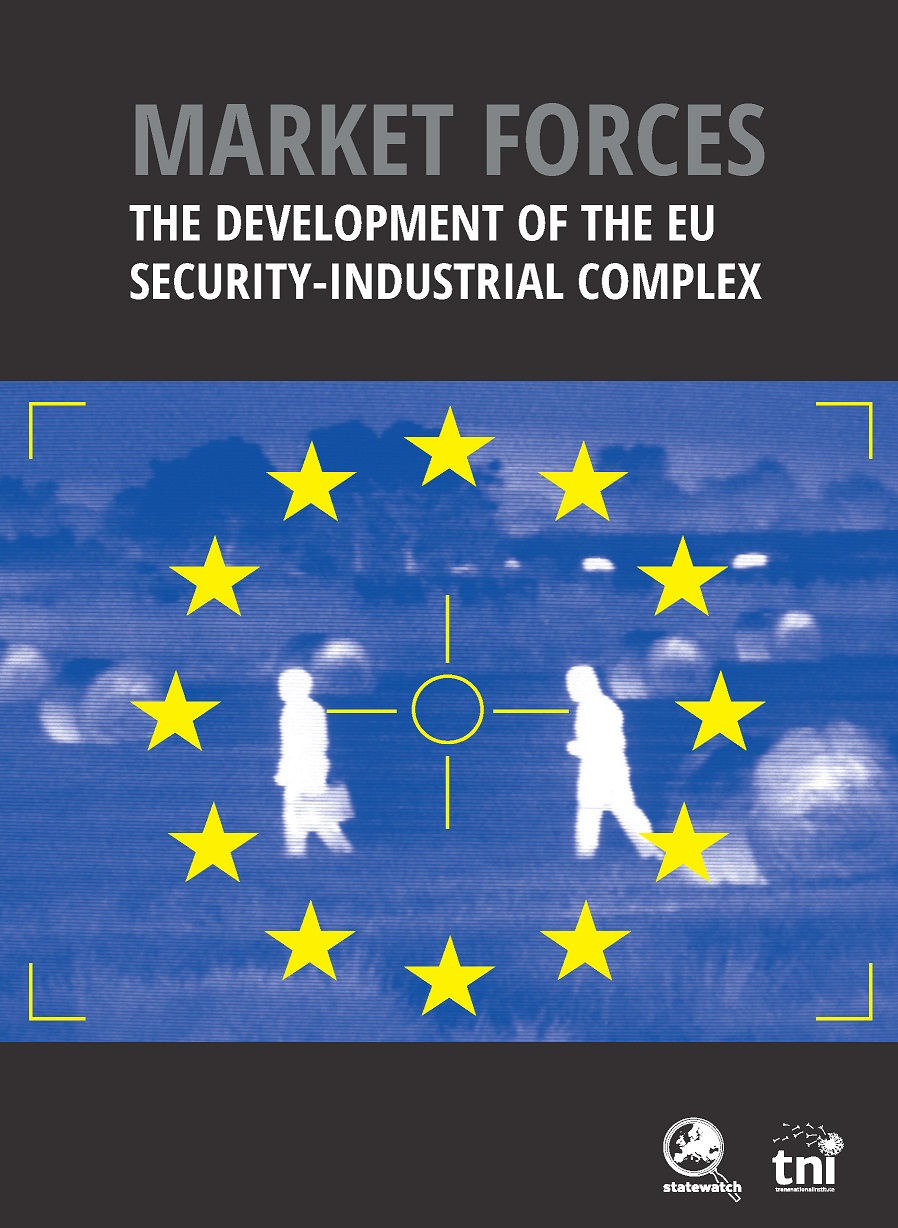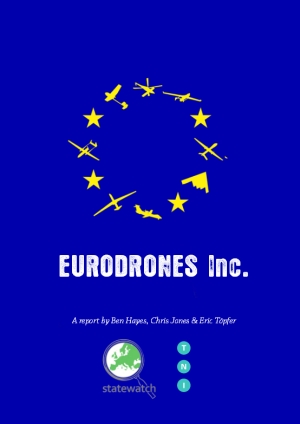European money for the war in Gaza: how EU research funding supports the Israeli arms industry
Topic
Country/Region
22 March 2024
Technologies developed with financial support from Europe are being used in the current war in Gaza, as they have been previously in occupation of Palestinian territory and marginalisation of the Palestinian people.
Support our work: become a Friend of Statewatch from as little as £1/€1 per month.

A drone (not produced by any of the companies cited in this article) in the sky. Image: Bold Content, CC BY 2.0
This article is published in partnership with Informationsstelle Militarisierung (IMI) and has an accompanying press release: EU-funded drone technology being used in war on Gaza. Sie ist hier auf Deutsch verfügbar.
EU research policy
The declared aim of the research policy of the European Union is to create a “a European research area” and to encourage the relevant industry “to become more competitive.” [1] This is currently carried out through the Horizon Europe programme, which has a total budget of €95.5 billion between 2021 and 2027. [2] In addition to organisations and companies from the member states, Turkey and Israel have been granted privileged access to the associated funds, while companies and institutions from the USA and other regions are largely excluded.
As the financing of “expenditure arising from operations having military or defence implications” by the European Commission is actually excluded on the basis of the EU Treaty, [3] no armaments projects may be financed within this framework, at least not officially. Nevertheless, since at least 2007, the European Union's research funding has been under well-founded suspicion of also sponsoring the European arms industry.
The 7th Framework Program for research (FP7, 2007-13) included a funding line for “security research” for the first time. In the 2006 study Arming Big Brother, Ben Hayes partly attributed this to the lobbying of the European arms industry, which had previously regrouped as a “security-industrial complex” due to the dissolution of traditional boundaries between internal and external security. [4]
Security research
Since then, numerous projects have also been funded for security research, from which arms companies have benefited under supposedly “civilian” themes such as border protection, disaster control and maritime surveillance. In many cases, it is unsurprising that technologies developed within this framework are now also being used in armed conflicts. In the case of Israel's military action in Gaza, it is also clearly demonstrable – and particularly problematic due to the exceptionally large number of civilian victims and the pending decision of the International Court of Justice on the accusation of genocide.
During Israel's ongoing war on Gaza, Statewatch published an open letter from 300 academics calling on the EU to stop funding research projects that could contribute to the violation of international law or human rights. The criticism focuses on the funding of dual-use research in Israel – that is, technologies that can also be used for military purposes. The letter explicitly mentions the two large Israeli arms companies Elbit and Israel Aerospace Industries (IAI), which have received funding from the EU for several projects. [5]
Back in 2015, a European network of pro-Palestinian groups, the European Coordination of Committees and Associations for Palestine (ECCP), already criticised the fact that Israeli arms companies were benefiting from EU research funding against the backdrop of occupation, military, police and settler violence. [6] Elbit and IAI as well as the major research projects OPARUS, IDETECT4ALL and FLYSEC were also specifically named at the time.
OPARUS in particular had already come under fire at the time for reasons other than IAI's involvement, as it supported large European defence companies (Airbus, Dassault, Thales and BAE) in designing the use of drones to suppress migration, in cooperation with the “border protection” agency Frontex, among others. [7] IDETECT4ALL aimed at developing new sensor systems to detect “intruders” in the vicinity of critical infrastructures. [8] Airport authorities were involved as potential users, and the research consortium was led by the British company Instro Precision, which mainly specializes in military sensor technology. The largest amount of funding for the project, around €333,000, was granted to Motorola Solutions Israel, which, according to the ECCP and other organizations, was already providing technologies for monitoring barriers, checkpoints and settlements in the West Bank, which is occupied in violation of international law.
The ECCP’s 2015 report identified a total of 205 projects involving Israeli companies or institutions that had altogether received €452 million in EU research funding, of which a good €32 million was for five “military companies and institutions.” However, this figure should be treated with caution, as it also includes the Hebrew University of Jerusalem as a whole. On the other hand, this list does not include many smaller companies that at least count the military or the police among their customers.
While it is more difficult to prove the concrete application of EU-funded technologies in the current war in the case of large companies such as Elbit and IAI, it is easier to identify corresponding connections in the case of smaller companies with a more transparent portfolio. This will be illustrated below using a number of research projects in the field of unmanned systems.
In 2014, our report Eurodrones, Inc. commented that: "Europeans may be shocked at the extent to which early EU thinking on drones was steered and honed by defence contractors from Israel – not an EU member state – looking for a civil market for their war robots."
Read more here.
ResponDrone: drone fleets
The ResponDrone project ran for three years from May 2019 and was awarded almost €8 million in research funding from the EU (of a total of almost €8.26 million). The declared aim was to develop “a multi-UAS platform for first responders to enhance their situation awareness” that could support emergency services with “enhanced capabilities to support assessment missions, search and rescue operations, as well as forest fire fighting." [9]
The project was coordinated by the German Aerospace Centre (Deutsches Zentrum für Luft- und Raumfahrt, DLR), which received €1.3 million from the EU. The Spanish manufacturer Alpha Unmanned Systems, whose Alpha 800 and Alpha 900 helicopter drones were used with various sensor systems in the field tests, received the single largest sum of just over €1.4 million euros. The second largest amount was awarded to IAI, with €1.4 million - far ahead of the French defence company Thales. The small consulting company Agora (€300,000) and the Ministry of Defence (€100,000) were also involved from Israel. Although the €100,000 for the Ministry of Defence is a rather symbolic amount, it is questionable why it is being funded at all for its involvement in a supposedly civilian research project by the EU - which is actually prohibited from spending on military and defence-related projects.
The implementation of the ResponDrone project is relatively well documented on the corresponding European Commission portal. [10] A report on the field tests (in Armenia, Bulgaria, France, Greece, Israel, Latvia and the Netherlands) shows, for example, that typical (civilian) incidents, the respective responsibilities and the previous use of drones and regulations for their use were assessed. In Israel, too, the focus was apparently on civilian incidents such as earthquakes and major Israeli cities. The role of the military as “first responder” is mentioned in the report but not further questioned. There are also no visible efforts to discuss issues of international law in connection with the occupied territories.
Although the project was apparently aimed at civilian applications, the potential dual-use applications are obvious. For example, under the scenario of rescue operations, sensor systems to locate and track people (also autonomously) were tested; and under the scenario of forest fires, models were developed to calculate the best location for dropping water on a fire. [11] The military relevance of the technology used should have been well-known to those involved, partly due to a minor scandal reported by Israeli and Spanish media back in 2016. At the time, the (nationalist-orthodox) Israeli Minister of Agriculture Uri Ariel had presented Russian Prime Minister Dmitry Medvedev with a drone from Alpha Unmanned Systems during a visit - which, against the backdrop of the annexation of Crimea and the “sensitive technology” contained in the drone, subsequently provoked criticism both domestically and from the Spanish government. [12]
In an early phase of the ResponDrone research project, two of the participants, IAI and Alpha, published a joint press release in which they presented a new, joint product, Multiflyer: “a squadron of small unmanned helicopters that can fulfill a large range of non-military and homeland security tasks”.[13] The supposedly clear exclusion of military tasks is questionable given the reference to “homeland security”, as this includes the deployment of the military in terrorist situations in Israel in particular, and even beyond the territory of Israel as recognized under international law.
In summary, it can be said that the Spanish drone manufacturer Alpha had already exported its technology to Israel before the ResponDrone research project. In collaboration with IAI the two placed a joint product, Multiflyer, onto the market. Both the ResponDrone research project and the Multiflyer product are about “fleets” of drones. However, the research project primarily focused on civilian applications such as rescue and dealing with (natural) disasters, while Multiflyer is focused on “advanced monitoring capabilities for large areas” in the context of “homeland security.” [14]
The role of IAI remains relatively cryptic in the reports on Multiflyer. In its press releases, the Israeli defence company refers primarily to its 50-year history in the field of unmanned systems, while “constantly seeking additional areas in which we can invest our R&D capabilities” and describes Multiflyer as a “significant milestone,” a development in which further progress can be expected. While IAI appears here more as an investor and sponsor, the roles are otherwise clearly defined: the commercially available drones used come from Alpha, the sensor technology for monitoring the areas from Sightec. The company Simplex is also explicitly mentioned, as is the involvement of “several Israeli startups." [15]
Sightec: autonomous flying and orientation
The Israeli company Sightec, which is involved in Multiflyer, also received funding of almost €2.5 million from the EU between April 2022 and December 2023 as part of the AUTOFLY project. The complete title of the project is “Delivery drones with situational awareness capabilities.” In its description, the project comes across as extremely civilian, talking in the introduction about the possible reduction of greenhouse gases through the large-scale use of drones in logistics, especially on the “last mile” and against the backdrop of the rise of e-commerce. [16]
In essence, however, the project aimed to use artificial intelligence to achieve the highest possible degree of autonomy, enabling the drones to move independently of GPS and even without radio communication. This is a visible effort to conceal military requirements in a civilian setting: the online commerce with “same-day service (within hours or minutes)” by unmanned aerial vehicles, which is in itself worthy of criticism, faces problems other than the jamming and spoofing that the AUTOFLY project explicitly seeks to overcome by funding Sightec. Although corresponding technologies for jamming and de-localisation have becoming more readily-available in recent years, and are thus potentially at the disposal of non-state and terrorist groups, GPS-independent and autonomous navigation under conditions of targeted jamming are primarily a military issue.
In February 2021 - before the EU provided any funding - the company claimed to have achieved a “worldwide first” by flying to targets autonomously in a field test. [17] The test took place as part of a project launched by Israeli civilian institutions such as the Ministry of Transportation and the Highways Administration; the scenario was apparently the delivery of unspecified goods. At this time, there were already isolated and weakly-documented references to Sightec systems being utilised by the Israeli police and even, in a July 2021 article, “in the recent conflict in Gaza against Hamas.” [18] A report in the Times of Israel, which is largely based on Sightec's own statements, speaks more generally of “first responders” being among the company's customers and “homeland security” being among the applications of their products. [19]
This was all before the EU-funded project started, which, arguing that delivery drones could reduce greenhouse gases, financed the development of an autonomous flight capability that was apparently already well-advanced at the time. A glance at the company's website leaves little doubt that the two products offered there are primarily aimed at the military and security authorities. [20] For the “NavSight” product, it is centrally and prominently pointed out that it enables navigation even where the GPS signal is disrupted and attempts at jamming take place. “SafeSight”, on the other hand, is offered explicitly for security authorities for automated object detection, area surveillance and analysis of crowds of people. Applications for civilian logistics are only marginally mentioned on the company's website and don't seem to play a meaningful role in the marketing of its products.
Xtend: 100% for the war in Gaza
EU research funding for the Israeli start-up Xtend and the application of its technologies for military purposes is even more direct. In the first half of 2020, it received €50,000 for a feasibility study on the Skylord Xtender drone system, which also examined commercial and customer potential. The diminutive “final report” of the project claims that, among other things, the company analysed the market for unmanned systems, identified further steps to optimise the existing prototype and found “[k]ey strategic partners for the production and commercialisation” as part of the project. [21]
A few months later, in May 2021, it was reported that the company had concluded a supply contract for drones of precisely this type with the US Department of Defense, and that the Israeli Ministry of Defence was also involved in this transaction. [22] The corresponding article also stated that Xtend systems were already being used by the Israeli special forces. It is now relatively clear that the company's customers are predominantly Western military forces, and the homepage currently also lists major companies such as Shell and Heineken as “partners”. In addition, the homepage is dominated by reports from international media such as the Wall Street Journal and The Economist about the role that Xtend in general and the Skylord Xtender in particular are playing in the war in Gaza. [23] This is being advertised quite aggressively. Even before that, many, sometimes martial, promotional videos for the Skylord could be found on the internet, emphasizing its use by Israeli special forces.
In the final report of the Xtend project, GPS-independent navigation in enclosed spaces was already identified as an outstanding capability that few competing products could match. The Economist then reported in December 2023 that Xtend's drones were not only particularly “well suited to buildings and tunnels in places such as Gaza city,” but were actually being used there. The article also states that the drones could be equipped with explosive charges to break down doors, for example. [24] A few days later, the Israeli trade journal CTECH profiled the co-founder and CEO of the startup, Aviv Shapira, and wrote: “Four days after October 7th, the IDF [Israel Defense Forces] chose Xtend as one of their core partners in the war against Hamas. Since then, their team has put its former activities on hold and redirected energies to supporting the IDF 100%.” “With its drone technology,” the journal states, “startup Xtend plays a crucial role in the ongoing war” in Gaza. [25] It is doubtful whether the EU's €50,000 in research funding has made a significant contribution here - but what purpose the funding of an obviously military and armaments-related start-up could have had beyond that seems equally questionable.
EU agency Frontex also has substantial contracts with Israel Aerospace Industries and Elbit for border surveillance drones.
Find out more here.
UnderSec: underwater drones
The UnderSec project officially began on 1 October 2023 and is fully funded by the EU with almost €6 million over a period of 3 years. Unlike the AUTOFLY and Xtend projects, where only a single Israeli company benefited from EU funding in each case, various companies and institutions are involved here. UnderSec is more similar in structure to the ResponDrone project: it is coordinated by the German research institute Fraunhofer-Gesellschaft, which is receiving almost €600,000 for the project. Rafael Advanced Defense Systems, a major Israeli defence company, is involved in this case and will receive almost €450,000, as well as the Israeli Ministry of Defence with €100,000.
While ResponDrone was intended to test a technology with clear military applications for civilian applications, UnderSec is investigating an issue that is even more clearly oriented towards the interface between military and civilian institutions: The aim is to develop “to develop a modular and holistic prototype system featuring multimodal sensors and robotic assets” in order to create greater situational awareness and improve the “response capabilities for ships, ports, and maritime infrastructures.” Tests in a controlled environment and “real-life demonstrations” are planned. [26] The brief project description makes no reference to the blockade of the Gaza Strip, which violates international law, and has a strong maritime component.
As the project is still at an early stage, no official reports are yet available. However, it can be deduced from the project description and the companies involved that unmanned underwater vehicles and buoys with different sensor systems are to be networked and tested. As part of the project, the Portuguese provider of underwater sensor drones Oceanscan is being funded with €350,000 and the Spanish defence company SAES, which is developing sensor buoys, with €361,000. In addition, various civilian research institutes and authorities (mainly from Greece) and the Portuguese Ministry of Defence are also involved. Rafael from Israel, which already offers extensive systems for maritime defence, drones and mine warfare, could act as a system integrator in a similar way to IAI in the project ResponDrone. It remains to be seen whether, as with Autoflyer, a joint product from the companies involved will be launched on the market in parallel with the research project. If so, it would be unsurprising if it were one with military applications.
Explaining EU funding for Israeli military companies and institutions
The relatively extensive funding of Israeli arms companies as part of EU research policy raises questions, not only against the backdrop of the occupation policy in violation of international law and the current accusation of genocide. At the same time, there are various possible explanations.
It could certainly be argued normatively that European states bear a special responsibility for Israel's ability to defend itself in a generally hostile environment, given their role in the founding of the state of Israel and especially Germany with regard to the Shoah. However, it seems questionable whether this rather subtle, normative and controversial assumption actually shapes and can shape the everyday practice of EU research funding.
A structural justification appears to be more viable, according to which the Israeli technology and defence sector has characteristics that make it particularly pertinent to be included in EU research programs. On the one hand, this includes the fact that Israel is considered a global leader in various technology sectors, which is often attributed to the concept of the “start-up nation.” This includes, among other things, extensive state funding and close networking between the industry and the state, in particular the military, intelligence agencies and start-ups. This also leads to a large number of small and medium-sized players involved, for whom EU research policy explicitly attempts to create privileged access. In other beneficiary countries, structures have emerged from industrial and professional associations and state authorities that support large and small companies and organisations that participate in the EU research programme and are in turn funded by the EU for this purpose.
Based on the experience of the “start-up nation,” it is conceivable that Israel was able to establish corresponding structures more quickly and efficiently or to draw on existing ones. The small consulting company Agora, which has already been briefly mentioned here and is involved in various EU projects with and without military links, is an example of a purely private sector and profit-oriented initiative. Finally, with regard to security research in particular, it should be noted that EU research policy focuses especially on the interfaces between internal and external security, which is already very pronounced in Israeli politics and industry against the backdrop of occupation and the threat of terrorism.
Finally, the extensive involvement of the Israeli (arms) industry could also be justified by European interests. On the one hand, Israel is a large market, potentially also for European arms companies, as the example of the Spanish company Alpha makes clear. New products are quickly applied here and can be marketed with reference to the IDF as a customer or as “battle-tested.” At the same time, the promotion of cooperation with the Israeli tech and arms industry could also be based on the expectation of a transfer of technology and know-how, because - as already mentioned - it is regarded as a leader in the sector.
Against this backdrop, the conservative German-Jewish historian Michael Wolffsohn, who taught as a professor at the Bundeswehr University for many years, recently described the call for a halt to German arm transfers to Israel as “stupid”:
Germany is more dependent on Israel's weapons than Israel is on German weapons. Israel's missiles and drones protect Germany and Europe, and without Israel, Germany's terror prevention or IT advances would be virtually non-existent. Only the dumbest calves choose their own butchers. [27]
In fact, the German and European arms industry appears to be dependent on cooperation with Israel in various fields of technology, for example in the field of artificial intelligence. The software for an AI-supported system for coordinating swarms of drones and infantrymen, which was recently tested by the German armed forces, came from the Israeli company Rafael. [28] It is not yet clear whether the training data for the development of this AI also originates from the occupied territories and earlier conflicts around Gaza, but this is not ruled out either.
Regardless, the EU's support for the Israeli arms industry is undoubtedly questionable from a moral and legal point of view - especially in light of the current indictment for alleged genocide in Gaza. This is justified, amongst other things, by genocidal statements made by high-ranking Israeli officials and politicians, including the Israeli Minister of Defence, [29] whose ministry is being funded to participate in EU research projects.
Author: Christoph Marischka, peace researcher, activist and member of the IMI board.
Notes
[1] Consolidated version of the Treaty on European Union and the Treaty on the Functioning of the European Union, Article 179, https://eur-lex.europa.eu/legal-content/EN/TXT/?uri=CELEX:12016ME/TXT.
[2] https://op.europa.eu/en/publication-detail/-/publication/1f107d76-acbe-11eb-9767-01aa75ed71a1
[3] Consolidated version of the Treaty on European Union and the Treaty on the Functioning of the European Union, Article 41(2).
[4] Ben Hayes: Arming Big Brother, TNI/Statewatch 2006, https://www.statewatch.org/media/documents/news/2006/apr/bigbrother.pdf
[5] Statewatch: Palestine: 300 academics call for halt to EU research funding that violates international law, 2024-07-02, https://www.statewatch.org/news/2024/february/palestine-300-academics-call-for-halt-to-eu-research-funding-that-violates-international-law/.
[6] ECCP: EU funding to Israeli military companies and institutions through Horizon2020, 2015-10-13, www.eccpalestine.org.
[7] OPARUS (Open architecture for UAV-based surveillance system) – Final Report, https://cordis.europa.eu/project/id/242491/reporting.
[8] Cordis: Novel Intruder Detection & Authentication Optical Sensing Technology – Fact Sheet, https://cordis.europa.eu/project/id/217872.
[9] Cordis: Unmanned aircraft systems platform to support situation assessment for first responders – Project Description, https://cordis.europa.eu/project/id/833717.
[10] Ibid.
[11] ResponDrone: D14.8 ResponDrone Period Report RP2 Month 22-36 (1/2/2021-30/4/2022), https://ec.europa.eu/research/participants/documents/downloadPublic?
[12] Times of Israel: Spain seeks answers for Israel’s drone gift to Russia, 2024-25-11, https://www.timesofisrael.com/spain-seeks-answers-for-israels-drone-gift-to-russia/.
[13] Globes Israel business news: Israel Aerospace unveils small helicopter drones, 2020-7-9, https://en.globes.co.il/en/article-israel-aerospace-unveils-small-helicopter-drones-1001341862.
[14] Ibid.
[15] Ibid.
[16] Cordis: GPS-free, beyond the visual line of sight navigation for logistics drones in urban environments – Reporting, https://cordis.europa.eu/project/id/190185259/reporting.
[17] Shoshanna Solomon: In 'first', delivery drone gets to destination in Israel without GPS signal, Times of Israel, 10.2.2020, https://www.timesofisrael.com/in-first-delivery-drone-gets-to-destination-in-israel-without-gps-signal/.
[18] Anastasios Giannakis, Michael Shoesmith, Madison Thomas: First Artificial Intelligence Swarm Drones Recently Utilized On The Battlefield – Implications, The Counterterrorism Group, 2021-19-7, https://www.counterterrorismgroup.com/post/first-artificial-intelligence-swarm-drones-recently-utilized-on-the-battlefield-implications.
[19] Shoshanna Solomon: In 'first', delivery drone gets to destination in Israel without GPS signal, Times of Israel, 10.2.2020, https://www.timesofisrael.com/in-first-delivery-drone-gets-to-destination-in-israel-without-gps-signal/.
[21] Cordis: Xtend - Extending Reality Skywards – Reporting, https://cordis.europa.eu/project/id/887959/reporting
[22] Seth J. Frantzman: Pentagon orders small Israeli drones for indoor special operations, Defensenews 2021-10-5, https://www.defensenews.com/unmanned/2021/05/10/pentagon-orders-small-israeli-drones-for-indoor-special-operations/.
[23] https://defense.xtend.me/
[24] The Economist: How Israel is using drones in Gaza, 2023-4-12, https://www.economist.com/the-economist-explains/2023/12/04/how-israel-is-using-drones-in-gaza
[25] Michael Matias, Yaffa Abadi: With its drone technology, startup Xtend plays a crucial role in the ongoing war, Calcalist, 2023-14-12, https://www.calcalistech.com/ctechnews/article/skrkv9u8t
[26] Cordis: Sensor-based prototype system for underwater security – Fact Sheet, https://cordis.europa.eu/project/id/101121288
[27] „Eine Gala der Pseudomoralisten“ - Kommentar des Historikers Michael Wolffsohn in der Sendung „Kutur Heute“ des Deutschlandfunks vom 25.2.2024, https://www.deutschlandfunk.de/geschichtsvergessener-jubel-michael-wolffsohn-zu-israel-bashing-bei-berlinale-dlf-07408870-100.html
[28] Rafael Advanced Defense Systems: Atos and RAFAEL win the German Army’s “Glass Battlefield” study tender, 2019-8-12, https://www.rafael.co.il/press/atos-and-rafael-win-the-german-armys-glass-battlefield-study-tender/
[29] Amongst other things, Yoav Gallant has said: “I have ordered a complete siege on the Gaza Strip. There will be no electricity, no food, no fuel, everything is closed,” and: “We are fighting human animals and we are acting accordingly.”
Our work is only possible with your support.
Become a Friend of Statewatch from as little as £1/€1 per month.
Further reading

Border surveillance, drones and militarisation of the Mediterranean
The growing use of drones and other long-range, increasingly-automated forms of surveillance and data collection are part of the militarisation of Europe’s borders in the Mediterranean, which have led to thousands of unnecessary deaths and push- and pull-backs to Libya, where migrants and refugees face arbitrary detention, violence, mistreatment and torture. This article, by the journalist Antonio Mazzeo, chronicles investments into and tests and deployments of drone technology by EU and national agencies in the Mediterranean.

Market Forces: the development of the EU security-industrial complex
While the European Union project has faltered in recent years, afflicted by the fall-out of the economic crisis, the rise of anti-EU parties and the Brexit vote, there is one area where it has not only continued apace but made significant advances: Europe’s security policies have not only gained political support from across its Member States but growing budgets and resources too.

Eurodrones, Inc.
Eurodrones, Inc. tells the story of how European citizens are unknowingly subsidising through their taxes a controversial drone industry yet are systematically excluded from any debates about their use. Behind empty promises of consultation, EU officials have turned over much of drone policy development to the European defence and security corporations which seek to profit from it.
Spotted an error? If you've spotted a problem with this page, just click once to let us know.

